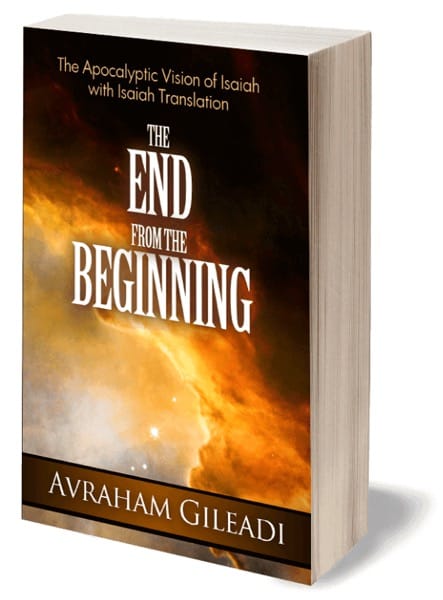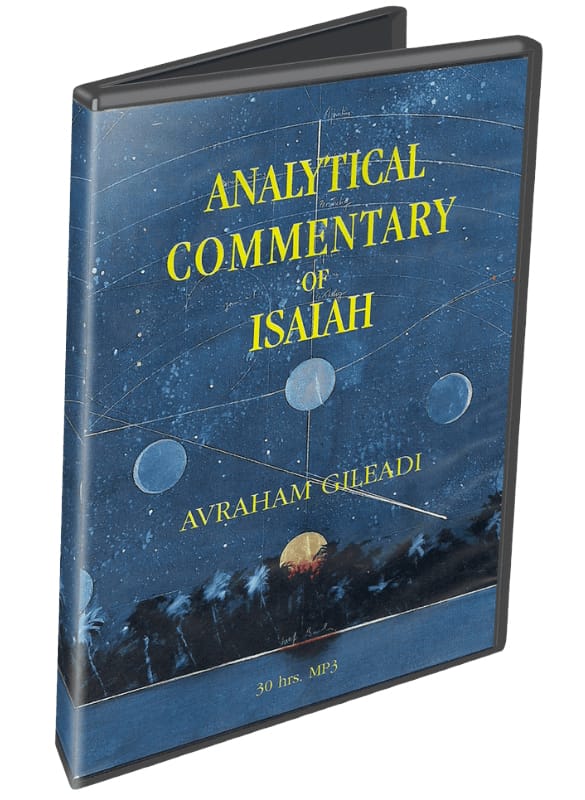Once we have established from Isaiah’s imbedded literary patterns that his book is an end-time prophecy—in which people and events of his day typify or foreshadow end-time ones—a lot of things fall into place when interpreting this greatest of all prophecies in the Bible.
Names of ancient nations, for example, now turn into codenames of end-time nations. In God’s Day of Judgment that ushers in his coming to reign on the earth, end-time world powers display the same character traits as did their ancient counterparts and play similar roles.
The great superpower of Isaiah’s day—Egypt—for example, has its equivalent in end-time America. Isaiah’s “Egypt,” however, is experiencing a downward spiral. When its leaders begin imperiling the nation, Egypt becomes vulnerable to enemies from within and from without.
Isaiah 19:13–15The ministers of Zoan have been foolish,
the officials of Noph deluded;
the heads of state have led Egypt astray.
Jehovah has permeated them
with a spirit of confusion;
they have misled Egypt in all that it does,
causing it to stagger like a drunkard into his vomit.
And there shall be nothing the Egyptians
can do about it,
Before long, civil war sweeps the land and the nation lies in ruin. Its economy fails and Egypt is severely weakened. A tyrannical ruler takes over the reins of power and oppresses the people. Drought and misery plague the nation and hostile foreign forces prepare to invade the land.
Isaiah 19:2I will stir up the Egyptians against the Egyptians;
they will fight brother against brother
and neighbor against neighbor,
city against city and state against state.
Isaiah 19:4Then will I deliver the Egyptians
into the hand of a cruel master;
a harsh ruler will subject them.
Isaiah 19:5–6The waters of the lakes shall ebb away
as stream beds become desolate and dry.
The rivers shall turn foul,
and Egypt’s waterways recede and dry up.
With the nation in chaos, Egypt’s archenemy—Assyria—sees its opportunity to attack. As a militaristic world power from the North, Assyria and its alliance of nations are unstoppable as God empowers them against Egypt and against all nations who rely on Egypt to save them.
In the end, Egypt’s fabled might of chariots and horsemen is no match for Assyria’s aggression. The world’s peoples who had looked to Egypt for help are sorely disappointed when God humbles Egypt and its hoped-for support proves of no benefit but a humiliation and disgrace.
Isaiah 31:1–3Woe to those who go down to Egypt for help,
relying on horses,
putting their trust in immense numbers
of chariots and vast forces of horsemen,
but who do not look to the Holy One of Israel,
nor inquire of Jehovah!
Yet he too is shrewd
and will bring disaster [upon them],
and not retract his words.
He will rise up against the brood of miscreants
and allies of evildoers.The Egyptians are human, not divine;
their horses are flesh, not spirit:
when Jehovah stretches out his hand,
those who help them will stumble
and those helped will fall;
both shall come to an end together.
Isaiah 20:4–6So shall the king of Assyria lead away
the captives of Egypt and the exiles of Cush,
both young and old, naked and barefoot,
with buttocks uncovered—to Egypt’s shame.
Men shall be appalled and perplexed
at Cush, their hope,
and at Egypt, their boast.
In that day shall the inhabitants of this isle say,
See what has become of those we looked up to,
on whom we relied for help and deliverance
from the king of Assyria!
How shall we ourselves escape?
In spite of these setbacks, however, certain covenanters in Egypt who swear allegiance to the God of Israel are sent a savior who delivers them from their oppressors. When they offer God an acceptable sacrifice, he extends his divine protection to them and heals the nation of Egypt.
Isaiah 19:20–22When they cry out to Jehovah because of the oppressors,
he will send them a savior,
who will take up their cause and deliver them.
Jehovah will make himself known to the Egyptians,
and the Egyptians shall know Jehovah in that day.
They will worship by sacrifice and offerings,
and make vows to Jehovah and fulfill them.
Jehovah will smite Egypt, and by smiting heal [it]:
they will turn back to Jehovah,
and he will respond to their pleas and heal them.
Along the same pattern, the militaristic nation of Assyria and its alliance that conquered the ancient world typifies an end-time “Assyria” and its alliance that conquers the modern world. God empowers end-time Assyria to destroy much of a humanity that has ripened in wickedness.
Isaiah 37:26–27Have you not heard
how I ordained this thing long ago,
how in days of old I planned it?
Now I have brought it to pass.
You were destined to demolish fortified cities,
[turning them] into heaps of rubble,
while their timorous inhabitants
shrank away in confusion,
becoming as wild grass, transiently green,
or like weeds on a roof
that scorch before they grow up.
Assyria’s excesses, however, cause God to punish it and its unholy alliance also. Its king’s narcissistic boasting of his military exploits brings upon him God’s judgments. By threatening to enslave and destroy God’s repentant people from the earth, he mocks and blasphemes God.
Isaiah 37:23–25Whom have you mocked and ridiculed?
Against whom have you raised your voice,
lifting your eyes to high heaven?
Against the Holy One of Israel!By your servants you have blasphemed my Lord.
You thought, On account of my vast chariotry
I have conquered the highest mountains,
the farthest reaches of Lebanon.
I have felled its tallest cedars, its choicest cypresses.
I have reached its loftiest summit, its finest forest.
I have dug wells and drunk of foreign waters.
With the soles of my feet
I have dried up all Egypt’s rivers!
Synonymous with the end-time Antichrist, the Beast in the Book of Revelation, and the King of the North in the Book of Daniel, the king of Assyria is given a brief time in which he serves as God’s instrument to cleanse the world of wickedness. Following that, he himself is removed.
Isaiah 10:12–14But when my Lord has fully accomplished his work
in Mount Zion and in Jerusalem,
he will punish the king of Assyria
for his notorious boasting and infamous conceit,
because he said,
I have done it by my own ability
and shrewdness, for I am ingenious.I have done away with the borders of nations,
I have ravaged their reserves,
I have vastly reduced the inhabitants.
I have impounded the wealth of peoples like a nest,
and I have gathered up the whole world
as one gathers abandoned eggs;
not one flapped its wings,
or opened its mouth to utter a peep.
After God has tested his people’s loyalties, he comes to the rescue of those who hold out faithful. Divine protection—a covenant blessing—takes effect when his repentant people look to him for deliverance. After their ordeal has lifted them spiritually higher, God intervenes on their behalf.
Isaiah 30:30–32Jehovah will cause his voice to resound,
and make visible his arm descending in furious rage,
with flashes of devouring fire,
explosive discharges and pounding hail.
At the voice of Jehovah
the Assyrians will be terror-stricken,
they who used to strike with the rod.
At every sweep of the staff of authority,
when Jehovah lowers it upon them,
they will be fought in mortal combat.
Isaiah 12:2–3In the God of my salvation I will trust without fear;
for Jehovah was my strength and my song
when he became my salvation.
Then shall you rejoice in drawing water
from the fountains of salvation.


